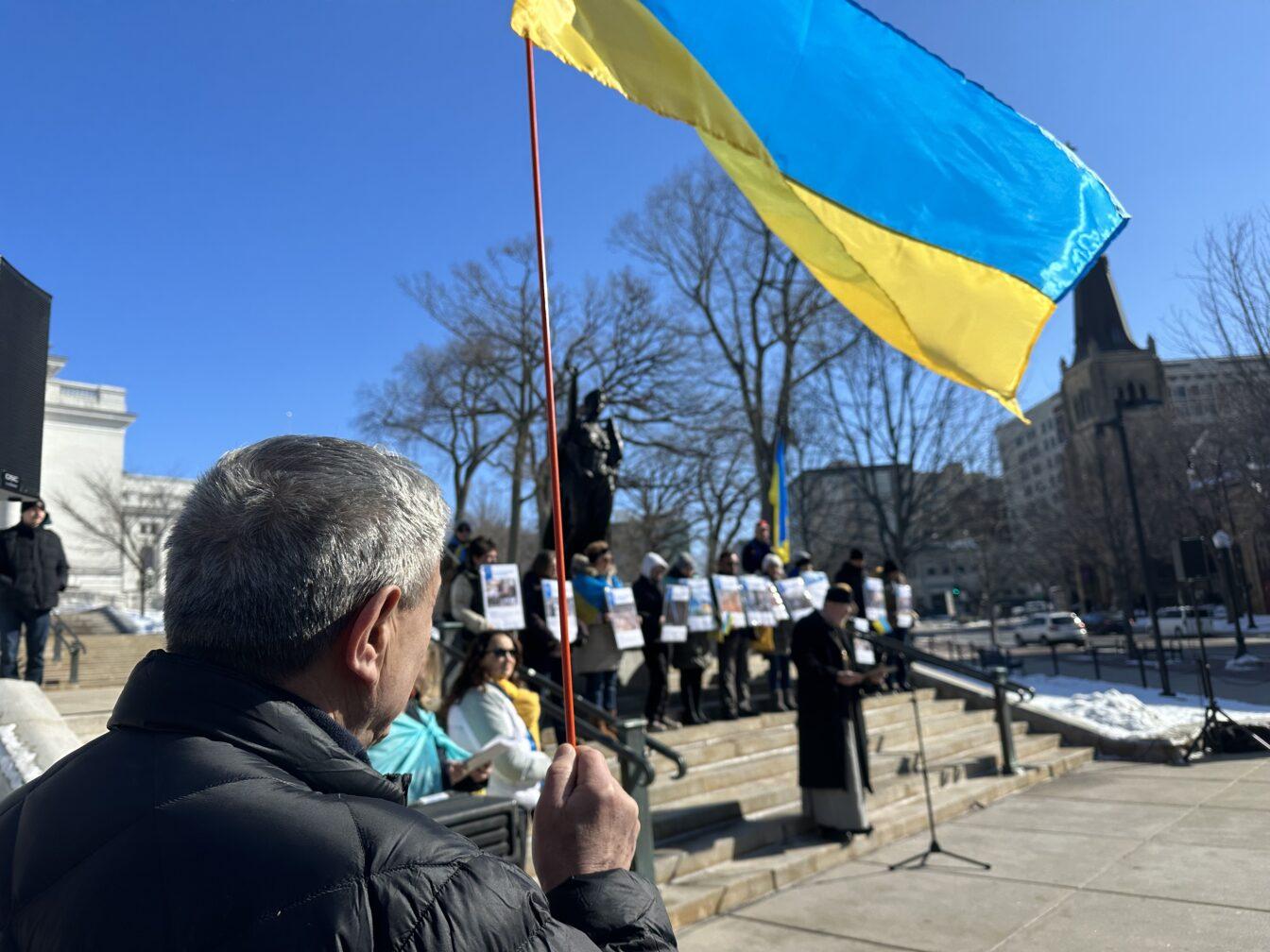Feb. 24, 2023, marked one year since Russia waged a full-scale invasion of Ukraine, causing millions to flee, killing thousands and destroying cities, according to AP News.
What Russian leader Vladimir Putin assumed would be a straightforward military victory for his country has not developed as such, according to University of Wisconsin professor of sociology Ted Gerber. Instead, Ukrainians have proven to be fearsome fighters and great tacticians.
But while Ukraine forces have been successful in counteroffensives and in gaining territory back from Russia, many civilians have been caught in the crossfire, according to NPR. Approximately 13,300 have been injured since the invasion, though this is likely an underestimate, according to the United Nations.
To commemorate a year of resilience of the Ukrainian people, over 120 people gathered at the Wisconsin State Capitol Feb. 25 for an event organized by Ukrainian-born activist Ruslana Westerlund and her colleagues. The event featured several speeches from the Ukrainian community including refugees, UW professors and spiritual leaders.
“Today we commemorate this year,” Westerlund said in her speech. “Three hundred sixty-five days of defending freedom, 365 days of resilience, 365 days of determination, 365 days of courage, 365 days of perseverance, 365 days of relentless desire to live, 365 days of being unstoppable, 365 days of being brave Ukraine.”
The event showcased the strong community of Ukrainians and their supporters. As Westerlund spoke, attendees dressed in blue and yellow greeted each other, waved flags and wept as they sung along to the Ukrainian national anthem.
In her speech, Westerlund said if she could describe the past year in one word it would be “courage” — courage to stand up to a country 30 times larger than Ukraine, to ask for ammunition, to absorb evil, torture and rape so Kyiv would not fall, to be separated from loved ones, to stop tanks by blocking streets with their bodies and to do much more.
“The victory of Ukraine will be the victory of every nation that values freedom and democracy,” Westerlund said in her speech.
At the event, Westerlund taught English speakers in the audience how to say “We stand with you, Ukraine,” in Ukrainian — Ми з тобою, україно. Phonetically, this is pronounced “My z toboyu, Ukrayino.”
Finally, a young Ukrainian refugee named Diana, wearing a Ukrainian flower crown called a Vinok, performed a song in Ukrainian after the speeches were finished.
Lecturer at UW Oksana Stoychuk and UW professor of political science Yoshiko Herrera both spoke at the rally.
Westerlund, always a fierce advocate for Ukraine, became especially vocal a year ago, when she organized a similar rally on the steps of the Capitol after the initial invasion. Since then, there have been a number of events to support Ukrainians.
Almost 18 million people are in desperate need of assistance and 14 million of those people have lost their homes, according to the UN. Millions of children have been killed, injured or orphaned.
Gerber said the U.S. has led the support to arm Ukraine, along with European allies and NATO, which has been vital in their war effort this past year.
In a surprise visit to Ukraine Feb. 20, President Joe Biden met with Ukrainian President Volodymyr Zelenskyy to emphasize U.S. support of Ukraine. While there, Biden announced a half-billion dollars more in assistance for weaponry, according to AP News.
“Both the U.S. governments and its European allies have provided billions of dollars in military assistance and economic aid,” Gerber said. “On top of that, many individuals and organizations have donated money to charitable efforts to assist Ukrainians who have been affected by the war.”
Since the invasion, many have fled the country to Western and Eastern Europe, Gerber said. Ukrainian refugees have also fled to the U.S. and continue to be supported by the global community, both locally and nationally, Westerlund said in an interview with The Badger Herald.
Locally, there are nonprofits and other programs dedicated to helping Ukrainians, including the Stoughton Resettlement Assistance Program — an informal collective in which community members are dedicated to assisting refugees in Stoughton, Wisconsin.
“They [SRAP] have done a lot to resettle furnished apartments and resettled refugees who are newly arrived in the town of Stoughton,” Westerlund said. “The local work has been really tremendous in terms of how they’ve supported Ukrainians.”
On the national level, a nonprofit organization called Razom provides critical humanitarian war relief and recovery and helps local Ukrainian volunteer organizations spread awareness and provide immediate assistance to those affected by the war.
According to Gerber, the stakes are high for Zelenskyy. While Ukraine continues to be backed by its powerful alliances, Russia continues to feed more troops into war, according to Gerber.
As both sides continue to battle, Ukraine continues to see support from the West, Gerber said. This support, both in military and humanitarian aid, not only helps Ukraine but empowers them to continue to fight.
In her speech, Westerlund said this is not a war of army against army.
“We don’t want this war,” Westerlund said. “I repeat — we don’t want this war. We are peaceful people who have been invaded at dawn when our babies were still sleeping. We’re trying to protect our homes. We’re trying to have a future as a people.”













